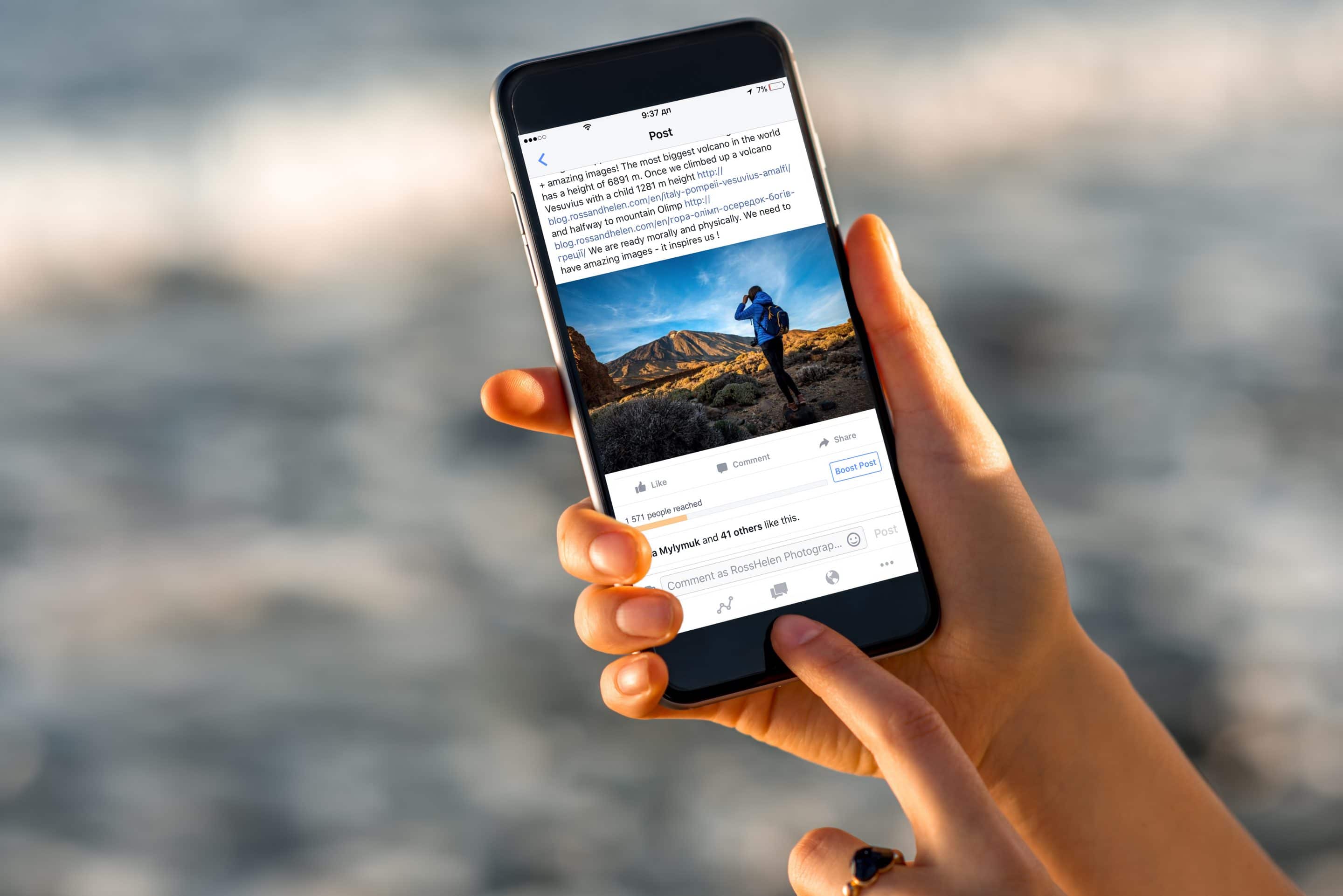Social media marketing is a form of internet marketing that relies on the process of gaining traffic or attention through social media platforms like Facebook, Instagram and Twitter. By utilizing these platforms to connect with potential customers, you can build your brand and increase sales.
Each platform has different resources and goals that can benefit your business in different ways. According to Statista, 70 percent of the U.S. population has at least one social media profile. By 2021, the number of worldwide social media users is expected to be roughly 3.1 billion people. So many consumers using social media every day creates a valuable opportunity for businesses who want to reach their audience through platforms they’re already spending time on. Users are active on social media platforms because these channels offer a fun and easy way to network, keep in touch with friends and family and stay connected with what’s going on in the world.
I’m going to touch on the three major social media marketing platforms that can help your business truly take advantage of all that the online marketing world has to offer.
Social Media Marketing With Facebook

Facebook takes the lead as the most widely used social media marketing platform by adults, meaning there is a never ending opportunity to expand your audience and drive traffic to your website.
Getting started on Facebook can seem overwhelming; if you’re ready to begin, check out these tips and tricks from Sprout Social to get the most out of the ever-powerful social media platform.
1. Create goals and address them.
Strong examples of Facebook goals are to expand brand awareness, increase community engagement and grow your sales. You can do this by adding value to those that follow your organization by offering important insight, information and resources to your audience. Make your Facebook page the go-to source for information on your industry.
2. Engage – don’t wait for your audience to interact first.
As a brand, you need to remember what makes a social media network tick; conversation and engagement should never be put on the back burner. View engagement like you’re building and providing a community for your audience. You can boost engagement by encouraging people to interact with your page. To really kick start the conversation, end your posts with questions or a call to action. Also, when you receive comments and messages, respond back right away. Remember, the whole point of social media marketing is to be social.
3. Schedule your Facebook content.
By working ahead and drafting a week’s worth of social media content at one time, you can focus on your content once a week instead of throughout the day. Then, you can use Facebook’s scheduling system to be post your pre-written updates every day at strategic times for your audience.
4. Encourage employee advocacy.
Motivate your team and ask them to share the business’ posts to their personal pages. Your employees are the faces behind your brand, making the business more relatable to consumers. Tap into this valuable asset when it comes to amplifying your message, social selling and authentic engagement by encouraging them to advocate on behalf of the brand. And unlike industry influencers, their services on social are free.
Social Media Marketing With Instagram
Instagram is no longer only meant for personal accounts. Whether for you or your dog, Instagram is a global platform that allows brands to humanize their content, recruit new talent, showcase products and inspire their audience. Below, I have compiled a list of opinions and ideas from Fortune 500 marketer Ross Simmonds on how to truly get the most out of social media marketing on Instagram.
1. Optimize your Instagram account.
One of the first things you’ll notice when landing on a business’ Instagram home page is their profile picture and bio. When crafting your Instagram biography, keep in mind that unique, compelling bios and memorable profile pictures are an important way to make a strong first impression on new viewers. In your bio, encourage users to take a specific action, such as using a certain hashtag or visiting your website. Your bio is the only place on the platform where you can feature a clickable URL and drive traffic to an external site, so use it strategically.
2. Follow relevant industry accounts.
Think about other businesses in your field. Whether they are your competitors or not, it is important to stay relevant and involved in your industry. Interact with their last few posts by liking them or leaving a comment. This will put your company’s name in front of their audience and tie you to that post that’s in their feed; this is one way to drive traffic to your page. You can also take a look at other users commenting on their post and potentially connect with them, too. Whenever you comment on Instagram, make your company stand out by leaving a brief, encouraging comment that’s related to their post, showing that you’re not a social media marketing bot.
3. Discover popular industry hashtags.
You can use hashtags as a way to discover new photos and people to follow. When you search for a specific hashtag, any photo (unless the account is set to private) that has used that hashtag will pop up for you to view. In a recent piece on Instagram marketing, Jason Quey said, “Look through the pictures posted by influencers in your niche. What hashtags do they use? Write these down as potential hashtags to use.” Keep a note of these hashtags and then, as you post content, include the relevant ones in your updates.
4. Post regularly.
One of the most commonly asked questions when it comes to any social media platform is, “How often should I be posting?” Although many companies have tried pinpointing a specific number, the reality is whatever works best for one brand does not always work best for another. Test out different posting techniques and compare engagement from one week’s worth of content to the next. In general, most major brands post on Instagram 5-7 times per week.
Social Media Marketing With Twitter
With over 313 million monthly active users and a young demographic to boot, Twitter is a valuable platform for most brands. In a recent article on Social Pilot, it is reported that Twitter marketing has proven to be a successful tool for social media marketing, especially for small businesses looking to target local customers. If leveraged strategically, Twitter can help you engage with your customers, increase your reach, grow your brand and generate qualified leads.
Growing a real following on Twitter takes more than sending out tweets whenever your company has a product being released or an upcoming event. It’s about engaging with your target audience and interacting with them. Successful Twitter marketing is powerful. If you can become a pro with this fast paced social media marketing site, you’ll unlock new opportunities to grow your business online.
1. Build a Twitter profile that stands out.
Your profile plays a crucial role in users’ decision-making process. In one look, the audience will decide whether they are interested or not, so ensure you take the time to complete your profile.
You can also use Twitter to drive traffic to your blog or website. Include links to your website and blog in your profile. This way, users can visit those links to find out more about your business. Be sure to choose memorable photos for your profile picture and header, too.
Another small detail is to is to update your pinned tweet regularly. It could be about a sale event coming up or a new marketing initiative you just launched. Either way, it’s the first thing your audience will engage with because it stays at the top of your feed.
2. Add value to your content.
When drafting social media marketing content to post, keep your target audience’s persona in mind. What will resonate best with them? What information do they need to know? When thinking about adding value on social, try asking yourself if your tweets advance an idea, entertain or educate the audience. Without any of those three things, your content is likely to fall flat. Additionally, remind yourself that the purpose of Twitter is to connect and spark conversations. If your content doesn’t inspire conversation, it’s not worth publishing.
3. Follow conversations and engage with your audience.
According to a recent article written by Bridget Poetker, senior content marketing specialist at G2, it is key to keep your call to action simple and direct. With a limited number of characters, it is important to get to the point. Stay up to date on your incoming notifications so you can respond to your viewers in a timely matter.
Today, social media marketing is being used by many businesses as a tool to achieve their promotional goals. With over 70 percent of the U.S. population using some form of social media, it seems almost obvious that companies should use these outlets to market their product or services.
Social media also allows you to better understand what your customers’ online behaviors look like. For example, you might use the analytics platform on Facebook or Twitter to see which types of content are most popular within your target market. You can also measure your conversions for posts and ads across channels to see which campaigns are working well and which need a little more work.
Each social media marketing platform has unique aspects that can jump start your business’ online presence. It’s up to you to learn what they are and how you can use them!
Read More:

